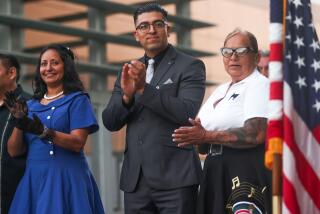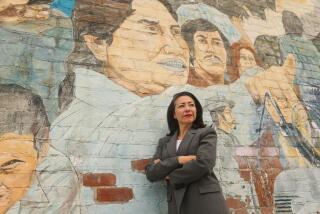ELECTIONS ’88 ORANGE COUNTY : Anaheim Looks to Set Record for Costliest City Election
In what is shaping up as the most expensive city election in Orange County history, Anaheim voters will go to the polls Nov. 8 to choose a mayor and fill two City Council seats.
It is expected that the 13 candidates--including two who are bidding for the largely ceremonial mayor’s position--will spend well over half a million dollars vying for three jobs that pay a total of $1,600 a month.
All that money, however, is chasing very little in the way of specific issues. Instead, a battle that centers mostly on personalities is being waged to accomplish what a special election last year failed to do: seat a council majority that can work together.
In the mayoral contest, Mayor Pro Tem Irv Pickler and Councilman Fred Hunter are seeking to replace Mayor Ben Bay, who announced this summer that he was leaving the top job and would not run for a council seat. His term expires in November.
Currently, the council is made up of two warring camps. On one side are Hunter and William D. Ehrle, who was voted onto the council in a 1987 special election called to fill a vacancy created by then-Mayor Don R. Roth’s election to the Orange County Board of Supervisors. On the other side are Pickler and Miriam Kaywood. Bay tends to vote with Hunter and Ehrle, although the alignments are far from absolute and have varied depending on the issues.
Kaywood won’t be up for reelection until 1990. Hunter or Pickler--whoever is unsuccessful in the mayoral race--will retain his council seat for another two years. Both were elected to four-year terms in 1986.
The schism within the council is reflected in the leading candidates’ campaign organizations.
Hunter is the standard bearer for the candidates who say the city must move away from the “old regime” and needs a “new direction.” Hunter, Ehrle and council candidate Robert S. Zemel have the endorsements of the police, fire and city unions as well as various homeowner groups formed in the past two years that have proved they can flex considerable political muscle on issues before the council.
All three men have hired political consultant Lois Lundberg to help with their campaigns.
Pickler says that the city is heading in the right direction but that the council needs strong leadership to work together. The mayor pro tem, who lost a 1986 mayoral bid to Bay by only 1,500 votes, has the support of many of the city’s traditional political activists, among them Herb Leo, a former redevelopment commissioner known locally as “Mr. Anaheim.”
Two other candidates who are seen as front-runners for the council seats are considered more sympathetic to a Pickler-led city: Thomas Daly, president of the Anaheim Union High School District Board of Trustees and an aide to Supervisor Roth, and Paul V. Bostwick, who served last year as chairman of the Katella Redevelopment Project Area Committee and who has close ties to the city’s business community.
Pickler thus far is the leading fund-raiser, reporting $97,919 cash on hand in his political war chest through the end of June. Hunter reported $38,944, with $11,000 in debts. Ehrle reported only $1,685 in cash on hand and $55,042 in debts, most of it in loans to himself. The next reporting deadline is Oct. 5.
But the four leading council candidates--Bostwick, Daly, Ehrle and Zemel--say they expect to raise up to $100,000 each by Nov. 8. Hunter said he hopes to get more than that. Pickler said he will raise $150,000 by the Oct. 5 reporting deadline and more by November. His campaign is being run by political consultant Eileen Padberg, who headed Vice President George Bush’s presidential campaign in the western states before the California primary.
Here are the candidates:
- W.R. Baker, 37, is making his second bid for a seat on the council. An operations analyst, Baker said he would make campaign spending reform an issue in the race. He said he will seek a cap on campaign contributions and wants council members to abstain from voting on issues involving campaign donors. He would also prefer to put major city issues, such as a proposed $50-million sports arena, on the ballot for voters to decide.
- Gustave E. Bode, 64, is a self-described “jack-of-all trades.” The retired milkman and former owner of various family businesses has run for the council three times before. Bode said he would like the city to provide more affordable housing in the downtown area so citizens need not have such long commutes.
- James R. Bonsteel, 36, was fired from a city parks job in 1986 for allegedly falsifying his time card. Now unemployed, Bonsteel is pursuing the matter through the courts after the city denied his grievances. “You can’t fight City Hall, but I’m trying,” Bonsteel said. He said his campaign is aimed at exposing city “cover-ups” as a result of his “own experience.”
- Paul V. Bostwick, 47, owns a recreational vehicle supply company and heads a mobile home park owners lobbying group. This is his first council race, and Bostwick said he wants to apply his business expertise to city affairs. He would like to revive a scaled-down version of the Katella redevelopment project in the Disneyland area “with no residential areas included.” The Katella project was rejected by the council last year after an overwhelming outcry by citizens who feared they would lose their homes.
- Thomas Daly, 34, is emphasizing his government experience as a supervisor’s aide. At the county level, he said, he has helped lead the fight against a jail in the Anaheim area and has “hands-on experience” in analyzing and solving traffic problems, cited in a recent city poll as the voters’ No. 1 concern in Anaheim. Daly would like to see downtown redevelopment speeded up, but with an emphasis on “quality” shops and services and “not try to impose a fancy downtown.” Daly said he will be “a strong and independent candidate.”
- William D. Ehrle, 46, owner of his own public relations firm, said his record in office sets “the foundation of what will transpire over the next four years in Anaheim.” Voters, he said, can choose now whether they want to go “back to the old regime” or “move ahead in a positive direction.” He pointed to renovations of the police building, the convention center, synchronization of traffic signals and steps to bring a sports arena to the city as accomplishments that “transpired in 16 months without a lot of fanfare and resistance.”
- James N. Grover, 51, a video advertising agency owner, strongly opposes redevelopment projects and says solutions to city problems lie in the private sector. “If push came to shove, I would in a heartbeat sell the (Anaheim) Stadium rather than raise taxes,” Grover said. “I am strictly private sector. There are too many things the city has their nose into that cost taxpayers money.”
- Fred Hunter, 46, is a personal injury attorney and former Anaheim police officer making his first bid for mayor. He says that if the “election were held tomorrow, I’d win big.” His campaign will pit grass-roots organizing through the unions and homeowner groups against Pickler’s “financial resources,” Hunter said. Hunter supports evening council meetings and said he wants to “build single-family homes in this city wherever I can.” Hunter vows that if elected, he will be a two-term mayor.
- Doug Kintz, 41, was co-founder and president of Anaheim HOME, a group formed last year to oppose the Katella redevelopment project. An insurance agent and buyer for an aerospace company, Kintz is regarded as the leading dark-horse candidate in the November council race. Despite his opposition to the Katella project, Kintz said he favors completing redevelopment projects already under way. Kintz supports rent stabilization and wants to establish a major marathon race in the city. He is highly critical of the large amounts of money spent in city elections.
- Irv Pickler, 67, a candidate for mayor, has served 6 1/2 years on the council and is a former county planning commissioner and Anaheim Union High School District board member. He now serves on six boards and committees, including the Orange County Transportation Commission. Pickler said that if elected mayor, he would stress “bringing the council back together to work as a team.” Pickler said downtown redevelopment has not proceeded “as fast as I’d like either,” but he points to the new City Hall and Willdan buildings as some of the downtown project’s success stories.
- Jerry Stoces, 21, is an aerospace purchasing agent making his first bid for a council seat. Stoces said his campaign this fall is his first step toward the presidency of the United States. “This is not a flip stunt,” he said. “Politics I plan for my career. This is public exposure, and that is a big plus.” If elected, Stoces said, his door will always be open to the voters.
- Karl L. Waterman, 35, is an electronics technician and holistic life-style counselor who said his “underdog” candidacy can make a difference if he is elected. “Supposedly the whole reason for public office is to help people,” he said. “I’ll be in there to help people and not have a private agenda.” Waterman said the council positions should be full-time jobs.
- Robert S. Zemel, 35, said he chose to run in his first council race after he realized that many other neighborhood groups had faced the same problems his Anaheim Hills Citizens Coalition encountered in stopping the construction of a planned church near his home and in battling for housing height limits. Earlier this year Zemel was appointed chairman of a city panel set up to regulate billboards. The owner of a real estate, escrow, insurance and mortgage business, Zemel said his main concern on the council will be encouraging single-family homes in Anaheim and keeping downtown zoning low- and medium-density.
Also on the Anaheim ballot Nov. 8 is a bond measure that would raise $30 million toward an ambitious plan to widen 33 major street intersections in the city. If it fails to get the two-thirds vote needed to pass, the $90-million intersection plan may be doomed.
ANAHEIM MAYORAL AND CITY COUNCIL CANDIDATES
In at-large elections Nov. 8, Anaheim voters will choose between two candidates for mayor (left) and among 11 candidates (right and below) vying for two open seats on the City Council. The mayor’s job is a largely ceremonial two-year post paying $800 a month. Council seats are four-year positions paying $800 a month. Council seats are four-year positions paying $400 a month.
More to Read
Sign up for Essential California
The most important California stories and recommendations in your inbox every morning.
You may occasionally receive promotional content from the Los Angeles Times.










